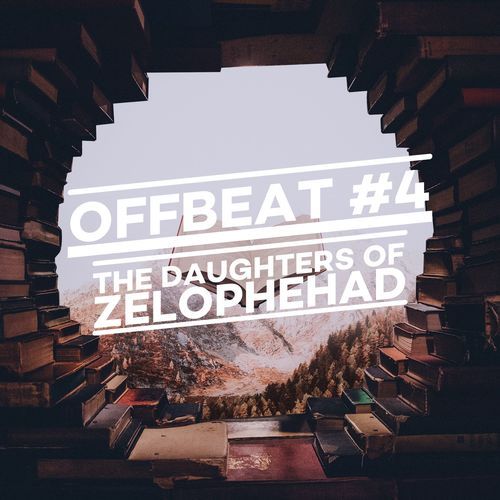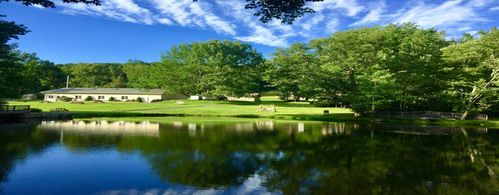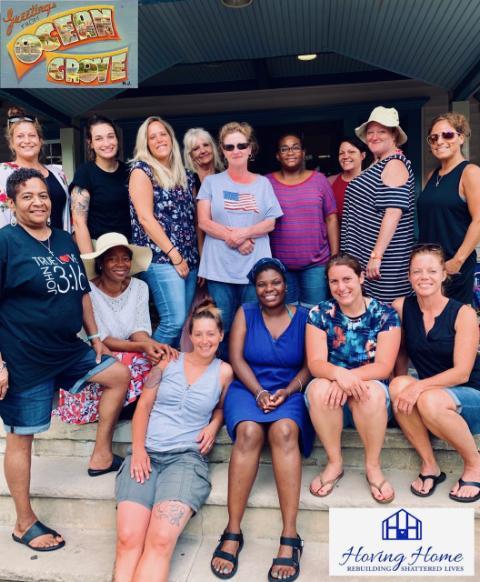Offbeat #4 - The Daughters of Zelophehad

The book of Numbers can seem like pretty dull reading, but its presence in Scripture is incredibly important. God had made three promises to Abraham and his descendants: that they would be a great nation, that they would have a land of their own, and that from them would come a blessing for the whole world. The book of Numbers serves as the proof of God’s fulfillment of the first two promises. It records, in great detail, the division of the land of Canaan among the tribes of Israel, which each comprised many thousands of people. It took hundreds of years and there were many bumps along the way, but God showed himself to be faithful.
In the midst of the account of the division of the land, we find the brief story of the daughters of Zelophehad: Mahlah, Noah, Hoglah, Milcah, and Tizrah (Num 27). Israel’s law declared that inheritance was to be distributed among the sons of the deceased. Zelophehad had perished in the desert wanderings of Israel but had left no sons, only daughters. With no sons, all his property would instead be given to his brothers. We’re told that Moses, Eleazer the priest, and the chiefs of all the people were gathered at the tent of meeting when Zelophehad’s five daughters approached and petitioned them saying, “Why should the name of our father be taken away from his clan because he had no son? Give to us a possession among our father’s brothers.”
Then we’re told that “Moses brought their case before the LORD. And the LORD said to Moses, ‘The daughters of Zelophehad are right. You shall give them possession of an inheritance among their father’s brothers and transfer the inheritance of their father to them.’” God went on to make a new law declaring that the same shall be done in any other similar cases. Not only did the women succeed in their own case, but they prompted God to yield similar protections to others.
Two things strike me about this brief story. First: the courage of the daughters. Women held lower status than men in that culture. For them to approach that imposing gathering of leaders with such a bold request shows incredible bravery. Second, I’m struck by the character of God. God’s response to the daughters’ request follows a pattern in scripture. Throughout his interactions with mankind, God shows special concern for the marginalized in society: the poor, the immigrant, and, in this case, women. We find this quality especially present in God incarnate. The book of Luke, in particular, repeatedly highlights Jesus’ elevation of women in a society prone to subjugate them.
Perhaps, though, some would argue that the request of the daughters was only a selfish grab at power and property or merely an attempt at self-preservation. The daughters, however, prove their character a few chapters later. In Numbers 36, the tribal heads complained to Moses that, if the daughters married outside of their tribe, their inheritance would pass outside of the tribe as well, fracturing the tribe’s allotment in Canaan. Once again, the case was brought before God, who agreed with the tribal heads. He told Moses that the daughters must marry within their own tribe. How did the women respond? “The daughters of Zelophehad did as the Lord commanded Moses” (Num. 36:10). Mahlah, Noah, Hoglah, Milcah, and Tizrah each married men from within their tribe. Their simple obedience shows that their concern was not merely for themselves but was truly for the honor of their father and their tribe. God preserved and protected them. Now they were willing to do their part to preserve and protect their community. What a great example of showing honor to parents and being faithful to community.
Our highly individualistic culture is often at odds with this kind of communal thinking. The call of the people of God is to live counter-culturally, demonstrating God’s kingdom by emulating God’s special concern for the marginalized and by making life decisions with community in mind. This kind of counter-cultural living requires the kind of courage possessed by the daughters of Zelophehad.
In the midst of the account of the division of the land, we find the brief story of the daughters of Zelophehad: Mahlah, Noah, Hoglah, Milcah, and Tizrah (Num 27). Israel’s law declared that inheritance was to be distributed among the sons of the deceased. Zelophehad had perished in the desert wanderings of Israel but had left no sons, only daughters. With no sons, all his property would instead be given to his brothers. We’re told that Moses, Eleazer the priest, and the chiefs of all the people were gathered at the tent of meeting when Zelophehad’s five daughters approached and petitioned them saying, “Why should the name of our father be taken away from his clan because he had no son? Give to us a possession among our father’s brothers.”
Then we’re told that “Moses brought their case before the LORD. And the LORD said to Moses, ‘The daughters of Zelophehad are right. You shall give them possession of an inheritance among their father’s brothers and transfer the inheritance of their father to them.’” God went on to make a new law declaring that the same shall be done in any other similar cases. Not only did the women succeed in their own case, but they prompted God to yield similar protections to others.
Two things strike me about this brief story. First: the courage of the daughters. Women held lower status than men in that culture. For them to approach that imposing gathering of leaders with such a bold request shows incredible bravery. Second, I’m struck by the character of God. God’s response to the daughters’ request follows a pattern in scripture. Throughout his interactions with mankind, God shows special concern for the marginalized in society: the poor, the immigrant, and, in this case, women. We find this quality especially present in God incarnate. The book of Luke, in particular, repeatedly highlights Jesus’ elevation of women in a society prone to subjugate them.
Perhaps, though, some would argue that the request of the daughters was only a selfish grab at power and property or merely an attempt at self-preservation. The daughters, however, prove their character a few chapters later. In Numbers 36, the tribal heads complained to Moses that, if the daughters married outside of their tribe, their inheritance would pass outside of the tribe as well, fracturing the tribe’s allotment in Canaan. Once again, the case was brought before God, who agreed with the tribal heads. He told Moses that the daughters must marry within their own tribe. How did the women respond? “The daughters of Zelophehad did as the Lord commanded Moses” (Num. 36:10). Mahlah, Noah, Hoglah, Milcah, and Tizrah each married men from within their tribe. Their simple obedience shows that their concern was not merely for themselves but was truly for the honor of their father and their tribe. God preserved and protected them. Now they were willing to do their part to preserve and protect their community. What a great example of showing honor to parents and being faithful to community.
Our highly individualistic culture is often at odds with this kind of communal thinking. The call of the people of God is to live counter-culturally, demonstrating God’s kingdom by emulating God’s special concern for the marginalized and by making life decisions with community in mind. This kind of counter-cultural living requires the kind of courage possessed by the daughters of Zelophehad.
Sean's Picks
A Biblical Critique of Secular Justice and Critical Theory - Justice is a hot topic these days (and so it should be), but if we're to "do justly" as God commands, we need to understand what biblical justice is. In this paper, Tim Keller compares four secular models of justice with biblical justice.
Being a Faithful Servant Rather than a Rebel Leader - This message is part two of a message on Christian workplace engagement looking at the life of Daniel.
Being a Faithful Servant Rather than a Rebel Leader - This message is part two of a message on Christian workplace engagement looking at the life of Daniel.
Missions Spotlight:
The Hoving Home

Hoving Home is doing a Virtual 5k fundraiser beginning on 9/5 and running through 9/12. We are looking for participants to join in the fun!
Here is a link to register: https://hovinghome5k2020.funraise.org/
We hope you will join us! It is a great way for individuals or groups to participate in a community effort, even during these very different times.
Here is a link to register: https://hovinghome5k2020.funraise.org/
We hope you will join us! It is a great way for individuals or groups to participate in a community effort, even during these very different times.
- Prayer for upcoming Graduation (9/26) and Virtual 5K
- Prayer for our Renovation Projects
- Prayer for our ladies continue on with the program, even though it is very different than our standard program design, which involves a lot of interaction and relationship building with volunteers, churches, pastors, and community.
- Prayer for continued financial stability for the Home in these financially uncertain times.
- Prayer for continued strength and stability for our staff team.



No Comments